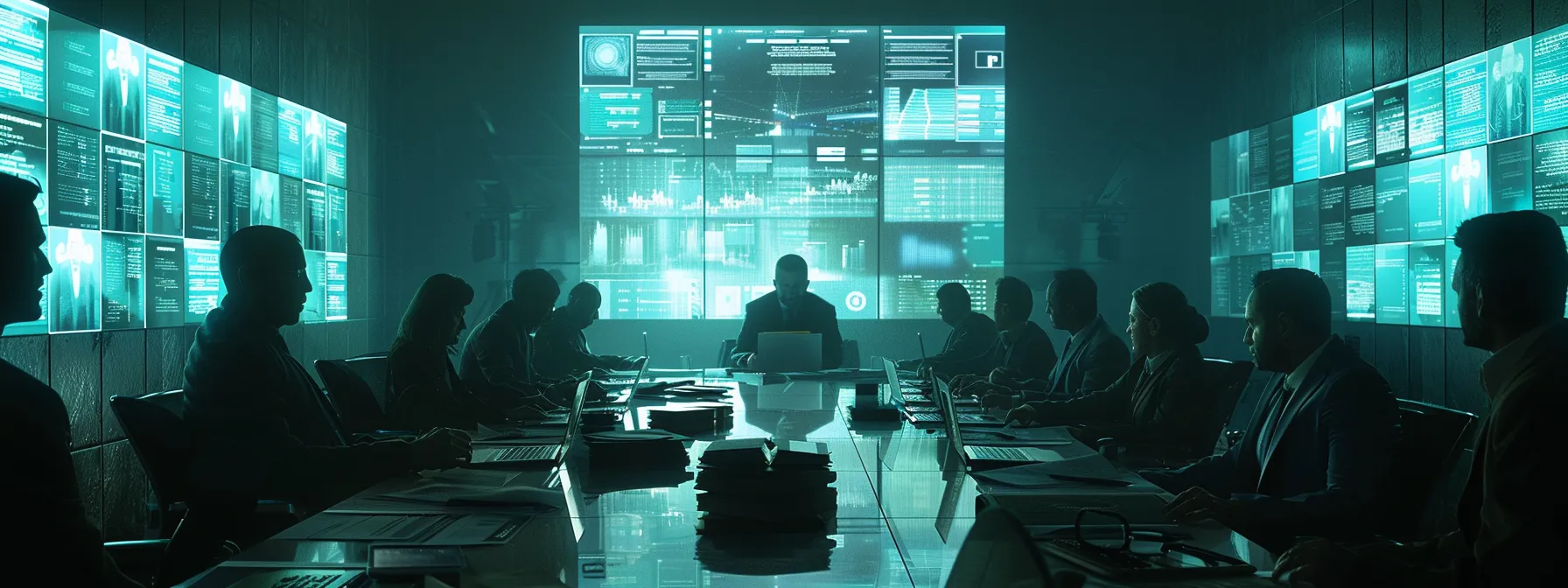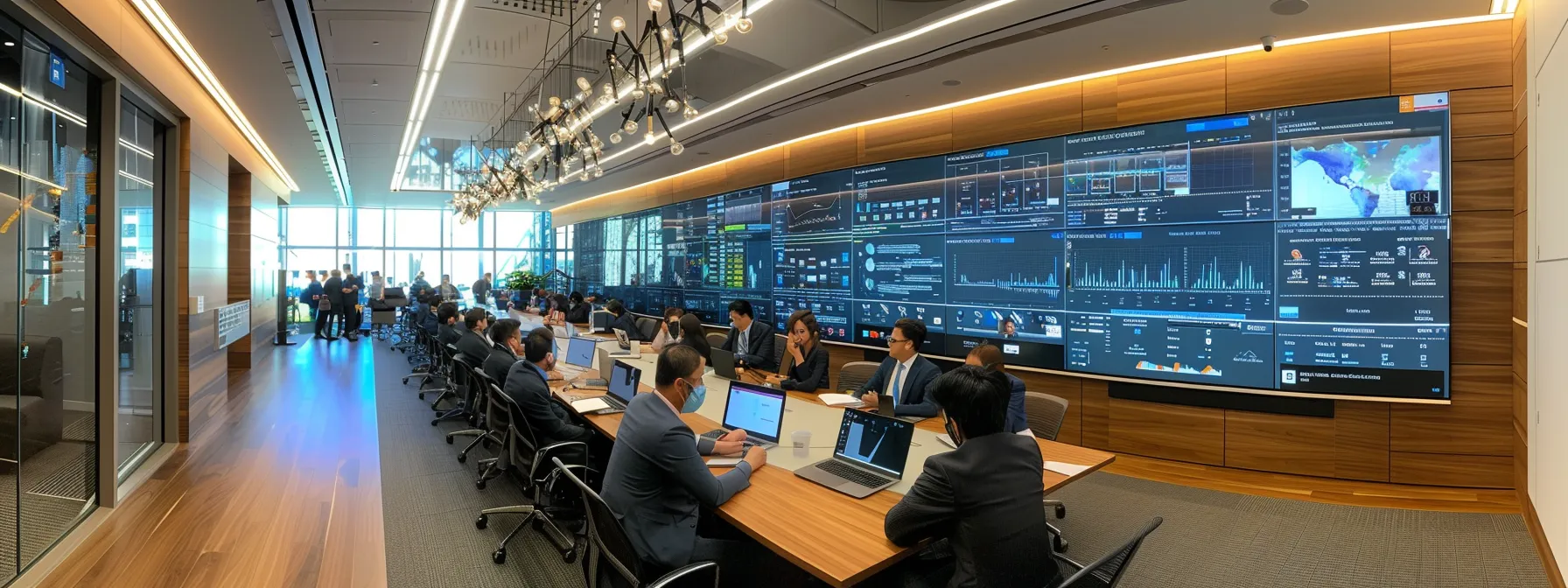
Top Risks Your Business Faces by Skipping a CMMC Consultant for Compliance
Navigating the CMMC compliance landscape can be challenging for many businesses. Skipping the expertise of a CMMC consultant poses significant risks, such as failing assessments, losing eligibility for Department of Defense contracts, and increasing vulnerability to cybersecurity threats. In this article, readers will learn about these risks and how expert guidance can safeguard their compliance efforts and protect their business reputation. Understanding and addressing these pain points is essential for maintaining compliance and ensuring business success.
Facing Failed CMMC Assessments Without Expert Guidance

Misunderstanding critical CMMC assessment objectives can lead to common mistakes that result in certification denials. The significant expense of re-assessment attempts can strain resources, especially for stakeholders focused on operational efficiency. Without proper preparation for CMMC audit scrutiny and lacking essential documentation, organizations face increased risks. Issues related to authentication or conflicts of interest can further hinder compliance efforts, highlighting the importance of expert guidance.
Misunderstanding Critical CMMC Assessment Objectives
Misunderstanding critical CMMC assessment objectives can create significant barriers to achieving compliance. Organizations often underestimate the complexity involved in meeting the requirements set forth by the National Institute of Standards and Technology (NIST), leading to inadequate risk assessments and misaligned security practices. This lack of skill in interpreting the CMMC framework can ultimately result in failed audits, wasted resources, and increased compliance risks for companies that choose to forgo expert guidance.
Common Mistakes Leading to Certification Denial
Common mistakes that lead to certification denial often stem from a lack of governance and oversight in compliance efforts. For instance, failing to implement adequate cryptography practices can expose sensitive data, which not only jeopardizes compliance but also endangered overall security. Without the guidance of a skilled consultant, organizations may misinterpret compliance analytics and overlook key areas like documentation and risk assessments, ultimately resulting in rejected certification applications and wasted paid time off spent on remediation efforts.
The Significant Expense of Re-Assessment Attempts
The financial implications of re-assessment attempts for CMMC compliance can be considerable for organizations in the defense industrial base. Without the guidance of an expert consultant, businesses may overlook critical assets such as antivirus software and access control measures, resulting in non-compliance. This oversight can lead to costly re-evaluations that not only drain financial resources but also divert attention from operational priorities essential for sustained success.
Inadequate Preparation for CMMC Audit Scrutiny
Inadequate preparation for CMMC audit scrutiny can severely impact an organization’s ability to achieve compliance. Without a well-defined methodology and the expertise of a vCISO, companies may struggle to align their current practices with the NIST Cybersecurity Framework, leading to gaps in security measures that can be easily identified during assessments. A robust security operations center is crucial for monitoring compliance and safeguarding sensitive information; lacking this support often results in unpreparedness that could result in failed CMMC assessments and further complicate the pathway to meeting regulatory standards.
Lacking Proper Documentation Required by Assessors
Lacking proper documentation required by assessors can significantly undermine an organization’s CMMC compliance efforts, leading to transparency issues that may damage its reputation. Without effective automation tools and consistent training on documentation practices, companies often find themselves unprepared to meet the thorough examination of auditors, risking certification denial. Investing in expert guidance can streamline the remediation process and ensure that all necessary documentation is not only complete but also readily available when needed, enhancing not only compliance but also operational efficiency.
Losing Eligibility for Department of Defense Contracts

CMMC certification is essential for securing Department of Defense contracts, as non-compliance can block access to critical government projects. Without the expertise of CMMC consultants, businesses risk jeopardizing existing contracts and future bids by failing to meet specific compliance mandates. The financial consequences of certification ineligibility can be significant, highlighting the need for proper project management and understanding of cybersecurity threats, including phishing.
CMMC Certification Requirements for DoD Contract Awards
CMMC certification is a mandatory requirement for businesses seeking Department of Defense (DoD) contract awards, clearly outlining the importance of meeting specific CMMC requirements. Organizations must demonstrate robust cybersecurity practices, including encryption of sensitive data and a proper accounting of compliance measures. Failing to adhere to these standards, especially for subcontractors, can result in lost opportunities and an inability to compete for lucrative government contracts, highlighting the critical need for expert consultation to navigate compliance effectively.
How Non-Compliance Blocks Access to Government Projects
Non-compliance with CMMC standards can severely restrict access to government projects, particularly for businesses looking to secure Department of Defense contracts. In today’s landscape, organizations that fail to meet compliance requirements risk losing not only lucrative contracts but also damage to their business model, limiting opportunities for innovation. Engaging in CMMC compliance consulting can guide companies through complex regulations, ensuring they implement necessary cybersecurity measures that safeguard their operations and maintain eligibility for critical government partnerships.
Jeopardizing Existing Contracts and Future Bids
Failing to engage a cmmc consultant can put existing contracts and future bidding opportunities at significant risk for businesses operating within the defense supply chain. The stringent requirements of the cybersecurity maturity model certification necessitate a thorough understanding of compliance mandates. Organizations that overlook these requirements may compromise their infrastructure’s security posture, jeopardizing both their ability to retain current contracts and to compete successfully for new government projects.
Failing to Meet Specific CMMC Level Mandates for Proposals
Failing to meet specific CMMC level mandates can lead to disqualification from bidding on Department of Defense contracts, significantly impacting a business’s growth opportunities. Organizations must align their cybersecurity practices with the code of federal regulations to meet these mandates effectively. Engaging a CMMC consultant can provide essential leadership and ensure that internal audits are thorough and compliant, incorporating guidance from industry standards such as those defined by ISACA for enhanced security frameworks.
The Financial Consequences of Contract Ineligibility
The financial consequences of contract ineligibility are significant for businesses within the defense sector. When organizations fail to achieve Compliance, they not only face the risk of losing existing Department of Defense contracts but also encounter considerable expenses associated with re-evaluations and potential lawsuits, especially if privacy laws are violated. Implementing effective risk management strategies becomes essential to maintain a robust IT infrastructure that meets compliance standards, ensuring businesses remain competitive while safeguarding their financial interests.
Draining Internal Resources on Complex Compliance Tasks

Underestimating the time commitment required for CMMC preparation can drain internal resources and lead to inefficiencies. Pulling staff away from core business functions to focus on compliance tasks often results in inefficient spending on unsuitable security solutions. Without specialized knowledge, extended implementation timelines become common, and the hidden costs of a DIY CMMC approach can escalate quickly. Each of these challenges underscores the critical need for gap analysis and expert CMMC consulting to mitigate risks effectively.
Underestimating the Time Commitment for CMMC Preparation
Organizations often underestimate the time commitment required for CMMC preparation, leading to vulnerabilities in their information security efforts. Engaging internal staff without the proper expertise in computer science can result in inefficient use of resources, as team members may struggle to manage documentation and compliance tasks effectively. This lack of attention to the complexities of CMMC can create evidence of non-compliance, ultimately jeopardizing an organization’s ability to secure contracts and maintain a robust cybersecurity posture.
Pulling Staff Away From Primary Business Operations
Pulling staff away from primary business operations to focus on compliance tasks can have detrimental effects on an organization’s overall efficiency and success. When employees are shifted to handling complex CMMC compliance responsibilities, their usual duties related to contracts and managing controlled unclassified information may suffer, leading to gaps in information privacy. This diversion of resources not only strains team dynamics but can also delay critical projects, ultimately compromising the organization’s strategy and its competitiveness within the industry.
Inefficient Spending on Unsuitable Security Solutions
Inefficient spending on unsuitable security solutions can significantly weaken an organization’s security posture, especially for those preparing for a CMMC audit. Without the right guidance from a CMMC consultant, businesses often invest in tools that do not align with compliance requirements or the specific laws governing their industry. This misallocation of resources not only fails to protect sensitive client data but also risks non-compliance with standards such as FedRAMP, leading to potential contract losses and legal repercussions.
Extended Implementation Timelines Without Specialized Knowledge
Extended implementation timelines often result from a lack of specialized knowledge in managing CMMC compliance. Organizations that attempt to navigate the complexities of the compliance process without expert guidance may find themselves struggling to address potential threats, leading to delays in necessary security measures. These prolonged timelines not only increase the risk of falling behind in the compliance landscape but also strain internal resources, diverting attention from core business functions and hindering overall operational effectiveness.
Calculating the Hidden Costs of a DIY CMMC Approach
Calculating the hidden costs of a DIY CMMC approach reveals that organizations can face unanticipated expenses that significantly impact their budget and operational efficiency. For example, attempting to manage compliance in-house often results in wasted resources, as teams may invest in inadequate tools or services that fail to meet compliance standards. This misalignment not only increases the risk of certification denial but also diverts valuable time and focus from essential business operations, underscoring the financial benefit of engaging a CMMC consultant to streamline compliance efforts effectively.
Increasing Exposure to Cybersecurity Threats and Breaches

Overlooking critical security gaps that a specialist would identify can lead to severe vulnerabilities within an organization’s infrastructure. This lack of insight increases the likelihood of data breaches, particularly when compliance shortfalls arise. Missteps in implementing CMMC controls can weaken an organization’s overall security posture, exposing it to potential legal and financial repercussions resulting from security incidents. Addressing these challenges is essential for maintaining robust defense against evolving cyber threats.
Overlooking Security Gaps a Specialist Would Identify
Overlooking security gaps that a specialist would identify can significantly compromise an organization’s defense against cyber threats. Many businesses lack the expertise needed to conduct thorough cybersecurity assessments, leading to unaddressed vulnerabilities such as outdated software or insufficient access controls. Engaging a CMMC consultant ensures that these critical gaps are identified and mitigated, safeguarding sensitive data and maintaining compliance with industry standards essential for ongoing operations.
Higher Likelihood of Data Breaches From Compliance Shortfalls
When organizations neglect to engage a CMMC consultant, they significantly increase their risk of data breaches due to compliance shortfalls. Without expert guidance, many businesses fail to implement crucial cybersecurity measures, such as effective access controls or regular security audits, leaving them vulnerable to attacks. These gaps not only jeopardize sensitive information but can also result in costly legal repercussions and damage to the organization’s reputation, making it essential for companies to prioritize compliance with CMMC standards to safeguard their operations.
Weakening Overall Security Posture Through CMMC Missteps
Skipping a CMMC consultant can lead to significant weaknesses in an organization’s security posture, particularly through missteps in implementing required controls. For instance, without expert oversight, businesses may fail to establish adequate access controls or neglect essential security audits, exposing themselves to potential breaches. Such vulnerabilities not only compromise sensitive information but also increase the risk of non-compliance with CMMC standards, making it crucial for organizations to engage knowledgeable consultants who can strengthen their security framework effectively.
Addressing the Legal and Financial Impact of Security Incidents
Addressing the legal and financial impact of security incidents is crucial for businesses aiming to uphold compliance and protect their assets. Organizations that experience data breaches face not only direct costs related to remediation and legal fees but also potential fines from regulatory bodies due to non-compliance with CMMC standards. Engaging a CMMC consultant helps mitigate these risks by ensuring that robust cybersecurity measures are in place, ultimately safeguarding the organization from costly consequences that could threaten its financial stability and reputation.
Failing to Implement CMMC Controls Effectively
Failing to implement CMMC controls effectively exposes organizations to significant cybersecurity threats, including data breaches that can severely impact their operations. Without the guidance of a CMMC consultant, businesses often overlook essential security practices, such as establishing proper access controls and conducting regular security audits. These oversights not only compromise sensitive information but also increase the risk of non-compliance with CMMC standards, ultimately threatening the organization’s reputation and financial stability.
Misinterpreting Complex and Evolving CMMC Standards

Organizations often face challenges in understanding the nuances across CMMC levels and domains, leading to common errors in control implementation. Struggling to keep pace with updates in the CMMC framework can further complicate compliance efforts. Inadequate documentation may fail to meet auditor expectations, and misapplication of CMMC practices within specific environments can jeopardize compliance, showcasing the critical need for expert guidance.
Difficulty Understanding Nuances Across CMMC Levels and Domains
Understanding the nuances across CMMC levels and domains poses a significant challenge for many organizations. Each level has distinct requirements, and failing to grasp these differences can lead to misaligned security practices that ultimately jeopardize compliance. For example, a business might assume that meeting the standards for a lower level suffices when bidding for contracts requiring a higher level, putting their eligibility at risk and necessitating a costly remediation process.
Struggling to Keep Pace With CMMC Framework Updates
Struggling to keep pace with updates in the CMMC framework poses a significant risk for organizations, as failure to stay informed can lead to misalignment with current compliance requirements. Many companies may not recognize the importance of regularly reviewing these updates, resulting in weaknesses in security practices that could jeopardize their certification status. Engaging a CMMC consultant ensures that businesses have access to the latest information and expert advice, helping them effectively adapt their security strategies to meet evolving regulatory standards.
Common Errors in Control Implementation Due to Misunderstanding
Common errors in control implementation often stem from a lack of understanding of the specific requirements outlined in the CMMC framework. For example, an organization might incorrectly assume that implementing security measures for a lower maturity level suffices for higher level contracts, leading to gaps in essential controls. This misunderstanding can not only jeopardize compliance but also result in rejected bids for lucrative government contracts, emphasizing the necessity of engaging a CMMC consultant to ensure precise alignment with evolving standards.
Creating Documentation That Fails Auditor Expectations
Creating documentation that fails to meet auditor expectations poses a significant risk for organizations seeking CMMC compliance. Many businesses underestimate the importance of detailed, accurate records, leading to incomplete or poorly structured documentation that auditors may reject. Engaging a CMMC consultant can ensure that organizations produce high-quality documentation that aligns with compliance requirements, ultimately increasing the chances of a successful audit and safeguarding their eligibility for critical contracts.
Applying CMMC Practices Incorrectly Within Your Environment
Applying CMMC practices incorrectly within an organization’s environment can lead to significant compliance failures and security vulnerabilities. A misunderstanding of specific requirements may result in inadequate security measures tailored to an organization’s unique operational context, risking both data integrity and business reputation. Without the guidance of a CMMC consultant, companies may inadvertently implement controls that do not align with their specific needs, jeopardizing their ability to secure necessary federal contracts and leading to wasted resources on ineffective compliance efforts.
Suffering Damage to Your Business Reputation and Trust

CMMC non-compliance can severely erode partner confidence, jeopardizing crucial relationships within the defense supply chain. The risk of exclusion from key contracts looms large, alongside the negative perception following compliance failures. This lack of adherence not only damages credibility but also complicates efforts to rebuild trust with prime contractors, underscoring the importance of maintaining stringent compliance practices.
How CMMC Non-Compliance Erodes Partner Confidence
CMMC non-compliance can significantly erode partner confidence, impacting businesses’ ability to collaborate within the defense supply chain. When organizations fail to uphold compliance standards, they risk not only their reputation but also their relationships with key partners, who may view non-compliance as a sign of unreliability or inadequate security measures. This loss of trust can hinder future business opportunities and collaboration, making it essential for companies to engage a CMMC consultant to ensure robust compliance practices are in place and maintain strong relationships with partners.
Risking Exclusion From Key Defense Supply Chains
Risking exclusion from key defense supply chains can have severe consequences for businesses that neglect to engage a CMMC consultant. Non-compliance with CMMC standards not only threatens eligibility for important contracts but also undermines established relationships with prime contractors, who may view a lack of compliance as a lack of commitment to security. By addressing compliance with expert guidance, organizations can strengthen their standing within the defense sector and protect their reputation while maintaining access to vital projects.
Managing Negative Perception Following a Compliance Failure
Managing negative perceptions following a compliance failure can be a daunting task for organizations. A lack of compliance can lead to skepticism from partners and clients, undermining trust and damaging relationships within critical supply chains. Engaging a CMMC consultant can help organizations not only achieve compliance but also restore confidence among stakeholders by demonstrating a committed approach to cybersecurity and risk management, which is essential for rebuilding reputation and trust in the marketplace.
Rebuilding Credibility Within the Defense Industrial Base
Rebuilding credibility within the defense industrial base requires organizations to demonstrate a steadfast commitment to compliance and cybersecurity. Engaging a CMMC consultant can provide the necessary expertise to implement robust security measures and rectify any past compliance failures, helping to restore trust with partners and clients. By aligning operational practices with CMMC standards, businesses can effectively showcase their dedication to maintaining secure environments, which is essential for regaining confidence in a competitive landscape.
Impact on Relationships With Prime Contractors
Neglecting to engage a CMMC consultant can severely impair relationships with prime contractors, as compliance is a critical factor in the defense supply chain. When businesses fail to meet CMMC standards, their commitment to security comes into question, raising concerns among prime contractors about reliability and operational integrity. This can lead to diminished trust and potential exclusion from future contracts, creating significant obstacles for collaboration and growth in a highly competitive environment.
Conclusion
Skipping a CMMC consultant for compliance exposes organizations to significant risks, including failed assessments and potential loss of critical contracts. The resulting financial strain from re-assessments and legal implications can hinder operational efficiency and growth. Businesses jeopardize their security posture without expert guidance, increasing vulnerability to cyber threats and data breaches. Engaging a knowledgeable consultant is essential to navigate CMMC requirements and maintain industry credibility, safeguarding long-term success and trust within the defense supply chain.




